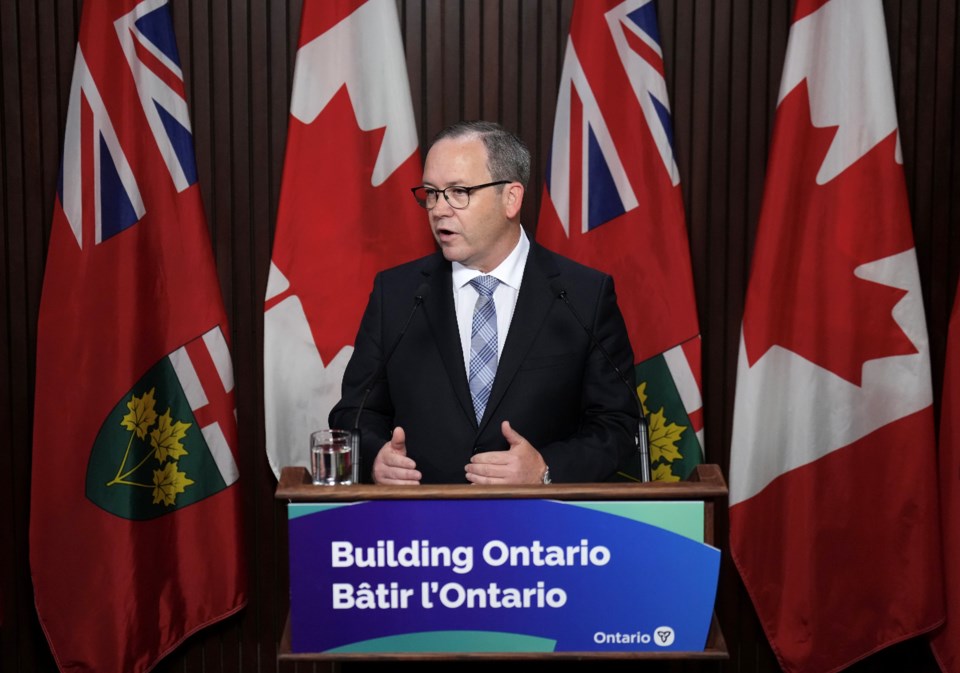EDITOR’S NOTE: A version of this article originally appeared on The Trillium, a new Village Media website devoted to covering provincial politics at Queen’s Park.
Victims of terrorism, human trafficking, hate crimes and auto theft will have an easier path to sue perpetrators for emotional distress if a new bill introduced on Thursday becomes law.
Attorney General Doug Downey's and Solicitor General Michael Kerzner's new bill — dubbed the Enhancing Access to Justice Act — makes several other changes, including banning growing cannabis in homes offering daycare services, scrapping mandatory coroner's inquests for worker deaths on construction sites, and more.
Many of the changes would update "outdated" laws to help bring the justice system "into the 21st century," Downey said.
"Victims of acts of terrorism, human trafficking-related offences, motor vehicle theft and hate crimes" targeting members of the clergy and places of worship will "be able to sue their convicted offenders for emotional distress and related bodily harm in civil court," Downey said.
Victims won't have to prove that their trauma exists in civil courts, he said, because in those cases "it's quite clear that there would be an effect, so we don't want them going back through that process to explain to a judge how they were emotionally traumatized," he added.
Downey was asked how the bill would actually make it easier for victims to sue given Ontario's courts are incredibly backlogged and it often takes years for victims who launch a civil suit to get a court date — let alone get an actual settlement.
"The changes we're making in this bill are helping to clear some court capacity," Downey said. "There are some pieces (in the bill) on vexatious litigants who are tying up tons of court resources. It's allowing the judges to better manage and easier manage some of those resource-suckers and they will make a decision in each case."
The province is working to staff up justices and justices of the peace as well, Downey said. There are about 300 of each currently working but "it's a continuous process to replenish as people are retiring."
The province is "pretty close" to the staffing levels it wants to see, he said. He's also in "regular discussion" with his federal counterparts "about getting our spots filled in Ontario."
Downey said he recently issued a directive to Crown prosecutors — separate from the new bill — "to look at their caseload to prioritize the most serious cases" to help clear the backlog.
Banning cannabis growing in home daycare centres wasn't on Downey's radar.
"Quite frankly I never imagined we'd have to legislative this," Downey said. "This came up because there were issues, surprisingly ... It's simply an exposure issue and we don't want it. We just don't want it commingling."
Federal rules permit people to grow up to four cannabis plants in their homes for personal use, even in cases where licensed or unlicensed daycares are run out of a home.
"British Columbia has had a similar rule in place for years and we feel it's safe and measured. It's a good way to limit youth exposure and access to cannabis and it's quite frankly the right thing to do," Downey said.
Another change in the bill is substituting mandatory coroner's inquests for worker deaths on construction sites for an annual review.
Under the current system, Ontario's chief coroner starts an inquest when one or multiple deaths occur.
"This lengthy process may not identify overarching health and safety trends and construction that could contribute to such deaths," he said.
Instead, the government's implementing an annual review process that would "lead to a broader systemic examination of safety issues in construction, and would produce more sector-relevant recommendations faster," Kerzner said.
Families will still be able to ask the coroner to do an individual inquest. The coroner will decide whether to move forward.
